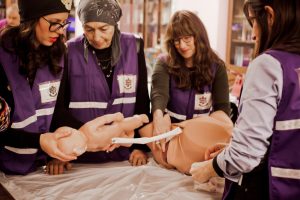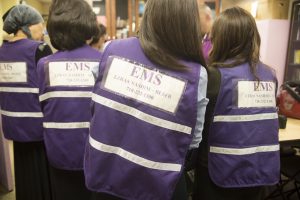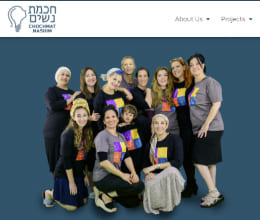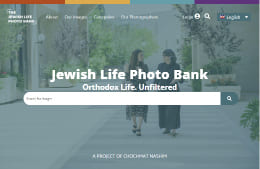Originally published in The Jerusalem Post, Magazine December 14, 2018
“Israel is more advanced than New York.” So declared Judge Ruchie Freier, the world’s first female hasidic judge, to an audience in Jerusalem after the Israeli premier of the documentary, 93Queen, at the Jerusalem Film Festival.
The film, created by Paula Eiselt, a Modern Orthodox Jewish women from Teaneck, documents the creation and establishment of Ezras Nashim the first religious all female EMT corps in Borough Park, New York. Boro Park is the largest Hasidic community in the US.
The Hasidic community holds stringently to the division of the genders, and men and women do not socialize or mix outside of family. Modesty is a prized value and women dress accordingly, with long skirts, stockings, long sleeves and high necks, regardless of the weather.
Hatzolah, the Jewish first response corps was created in the 70s to serve this insular community by people from within the community who understand their sensitivities, religious needs and language (the majority speak Yiddish). The original plan for the corps included women among the ranks, but at the last minute, the 300 women who trained and became certified were denied admittance.
In 2010, the rebbe in New Square decided that women should be a part of Hatzolah to serve women, so in New Square — and only in New Square — Hatzolah incorporates women EMTs.

In 2011, a group of women, (many of whom had kept up their certification since the failed women’s division) concerned that women’s modesty was being compromised in emergent situations, and that they would be better served by other women, approached Freier, then a lawyer to help them establish a women’s branch of Hatzolah in Boro Park.
Freier points out, “It was always the women who cared for women, especially in childbirth.” Citing Yocheved and Miriam, Moshe’s mother and sister who tradition holds were midwives to the Jewish women in Egypt, Frier said they were simply taking back what had always been in women’s hands.
Hatzolah refused. Women can’t run fast enough, they said, and lives would be at risk if they allowed female EMTs.
“The best way to get me to do something is to tell me I can’t do it,” says Freier in the film. The audience sees just how true this is, as the movie documents the four years that she and a number of dedicated women struggle against incredible odds to succeed in establishing the first Jewish women’s EMS corps for and by women.
These odds included multiple attempts by Hatzolah to sabotage Ezras Nashim. Gasps and outrage rang throughout the theater at methods employed by Hatzolah to shut down Ezras Nashim.
It was to this Freier referred when she said, “Israel is more advanced than New York.” Here, in Israel, both MDA and Ichud Hatzalah, the two recognized national emergency service providers include female volunteers of all backgrounds, Jews, Muslims, Bedouin, Christian, Druze, religious and non-religious.

Despite the fact that an organization that discriminates against gender or race is disqualified from public funding, Hatzolah of Boro Park has received public funding, including a grant of half a million dollars from the city of New York. When asked how this was possible, Freier, who spoke by phone from outside the library where she was studying to renew her paramedic license, explained that in order to show discrimination, someone would have to sue, and Freier says, “That was something I just wasn’t willing to do. I didn’t want to damage Hatzolah and split the community.”
Instead, she wants to learn from others who incorporate women successfully. To that end, Frier visited United Hatzalah headquarters in Jerusalem. (Israel’s United Hatzalah has no affiliation with Hatzolah in the US).
When he founded United Hatzalah, Eli Beer, had a goal of three-minute response time. In order to reach that goal, Beer knew he needed as many responders as possible. So, United Hatzalah has included women since its inception, and has female responders from Eilat to Kiryat Shmona. Now, with 5,000 volunteers, that response time goal is down to 90 seconds.
Haredi women are a recent addition as few, if any, were trained. Just as in Boro Park, Gitty Beer, wife to Eli and an EMT in her own right, recognized a need for women to respond to women. “It’s simply natural for a woman to want a woman, and even more so a very religious woman. The moment I walk into a room, she knows I understand her, that I’ve been her, that I speak her language. Of course men can take care of women, but there is an option to have a woman medic who is just as professional, why not? I once responded to a woman who fell in the bath. She was beside herself when men came in. I showed up right after — she was so relieved to see me. She was an older woman, not religious, but she was so happy I walked through that door.”
Recognizing the need specifically for haredi neighborhoods, Beer created a special women’s division which trained Israeli haredi women to be EMTs, enabling them to respond to neighbors who, when ill or in labor were being treated by local men whom they knew, something they found highly uncomfortable. The courses were funded by the Lions of Judah-Israel, a community of women who contribute to a common fund dedicated to the advancement of women and girls in Israel.
Freier’s experience echo’s Beer’s. “I’ve seen women who called both Hatzolah and Ezras Nashim. I see the humiliation on the women’s faces when men come charging in at their most vulnerable, exposed time. It adds trauma to the moment for no reason. When we respond, we are able to keep them calm and get them to the hospital calmly and on time.”
Freier visited United Hatzalah headquarters and was blown away by what she saw. “I was here a few years ago when they were just starting to talk about this woman’s division. I can’t believe how far they’ve come in such a short time. Look what you can do when you work together with people and respect everyone’s differences.”
For Freier, It is God’s Will that determines Ezras Nashim’s success. Her request is simple, “I would like Hatzolah to acknowledge our right to exist. I don’t think we will merge, I think it is Hashem’s plan is for us to exist as a separate entity, but to work together, and I would very much like us to coexist peacefully.”

Ezras Nashim is up and running and despite all the hurdles it has faced, is opening more branches, including one at Stern College, Yeshiva University’s women’ campus. Other New York neighborhoods have asked Freier and her cohort to help start women’s divisions in their neighborhoods, as well.
And Freier sees movement among the men. “More and more members of Hatzolah show me that they support us and our work. As young boys grow up and become men, their generation will support Ezras Nashim. They see that their mothers are capable. In their minds, there is no doubt that women are capable.”
She also stresses that she has rabbinic backing, both in the US and in Israel, rabbis such as Rav Ahron Leib Shteinman zt”l, Rav Yitzchok Zylbershtein, Rav Chaim Kanievsky and his daughter Rabbanit Kolodedsky, Rav Yaakov Moshe Hillel, Rav Moishe Brandsdorfer, and Rav M. Zvi Bergman.
While initially reticent to have the birth of Ezras Nashim filmed, Freier (and her rabbis) were convinced of the value of the enterprise when Eiselt explained that it would be a Kiddush Hashem, a sanctification of the Name of God in the world. Indeed, Freier says, “I think the film did a lot of good, especially in showing options for religious women. A young woman approached me in Tel Aviv saying, ‘If I had seen this film as a girl, I would have stayed religious. To see frum women achieving, succeeding, trailblazing… I wouldn’t have felt so stifled.”
Freier feels that King Solomon had it right in his penning of A Woman of Valor: “I believe in a woman’s unique roles in the world. I believe she is the foundation of the home, the moral support of the home. She’s not only in the kitchen making cookies, she’s on the phone making deals doing business, getting things done — even while she makes the cookies!”
Currently, Ezras Nashim is seeking a license for its own ambulance. In order to be approved for an ambulance, Ezras Nashim must show communal support. A petition has been created to do just that and Freier asks everyone who supports their cause to sign it. It is on their site at Ezras-nashim.org, and of course, donations are very welcome.
Freier says that she feels Ezras Nashim needs to grow in baby steps in order to be strong and lasting. From a woman who became a lawyer at 40 (she says she didn’t want to be a legal secretary forever), and a judge a scant 10 years later, one can’t help but suspect those baby steps might be followed by giant leaps sooner than she thinks.
Photo stills from the movie ‘93 Queen’ showing in Israel on YES and STINGTV 12/16 8:00PM – Courtsey


